Jeremie Averous's Blog, page 154
March 10, 2012
Successful launch of Project Soft Power concept: having fun around the Fourth Revolution
During a talk given on 6 March, 80 members of the Singapore project management community discovered my new concept of Project Soft Power™!
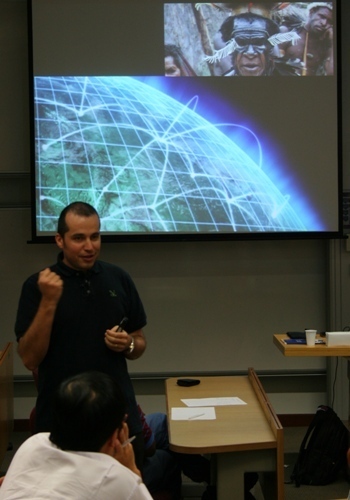
Project Soft Power and the Fourth Revolution
It is basically a cross over from the Fourth Revolution and Emotional Intelligence applied to Project Management. Do you recognize the slide at the back?
This talk sponsored by the Singapore Chapter of the Project Management Institute was very well received. And more over we all had fun through the exercises that were designed to have the participants discover more about themselves! See here the summary report on SPMI website. Click here to access the Project Soft Power slides on slideshare.
The Project Soft Power book is now in the last stages of production for a publication in May of this year. Or, you can also ask us for a keynote speech. In any case, stay tuned!
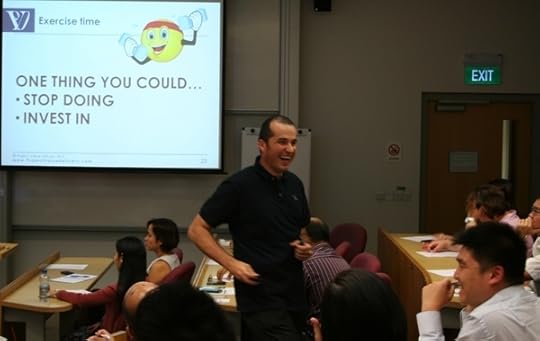
Project Soft Power presentation in action - having fun!

March 8, 2012
Fourth Revolution literacy: do you follow the basic rules for social networks?
The Fourth Revolution is a great opportunity. Social networks are fantastic communication and creation tools. As with all powerful tools, social network can be used the wrong way.
A new literacy for the Fourth Revolution is needed; it will without doubt be widespread in a few years time. Let's just remind us of some rules that need to be followed when it comes to using social networks.
 Mitch Joel in his blog post "keep yourself alive" reminds us about a few:
Mitch Joel in his blog post "keep yourself alive" reminds us about a few:
Don't link to spouses and children
Don't publish anything private
Be careful of groups you join (groups are not more private)
Make your acquaintances as close as your friends
Be leery of platforms with open APIs (they give third parties access to the data)
These are already advanced rules, beyond some obvious ones: don't put your address or phone number, don't post all your personal data like social security number or bank details…
Some schools start discussing these rules with children. When will they be part and parcel of all basic education?

March 6, 2012
Video of the month: the Open Enterprise by Shereef Bishay
VIDEO OF THE MONTH: Shereef Bishay – Open Enterprise: Applying Open Source Principles to the way we Work – on the organization of the Collaborative Age is a real eye-opener on how conventional workplace is boring and how to transfer open-source software development organization into 'open enterprises'. Remember – conventional organizations are bust as a concept!
Shereef explains how to setup the organizations of the Collaborative Age and gives inspiring examples. Enjoy!…

March 4, 2012
So, will you be coming to attend my public talk on "Project Soft Power"? 6 March at 7:30pm!
Don't miss my public talk on the 6 March 2012 at the Lee Kong Chian School of Business in Singapore at 7:30pm!
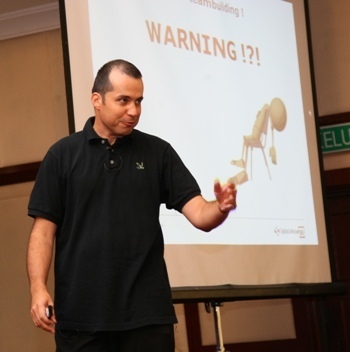
Jeremie in action during a public speech!
This talk is hosted by SPMI, the Singapore Chapter of the Project Management Institute. More information on this event on the website of the SPMI.
Pencil already this event in your agendas to discover Project Soft Power, the Secret of the Great Project Leaders! in a unique occasion before the publication of the book later this year!
I have been preparing this show for some time now, come and participate to a mind-changing occasion!
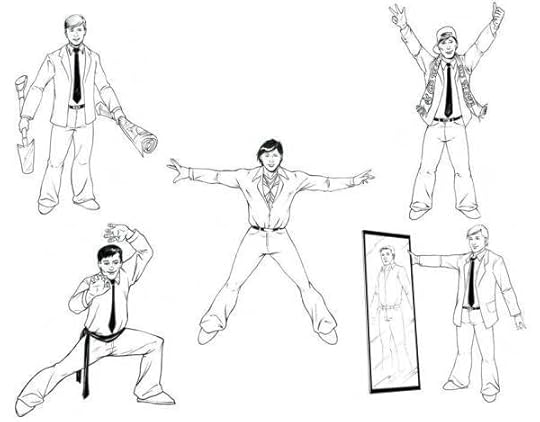
Project Soft Power characters
"The most successful project leaders rely not only on their technical and analytical skills, but also on strong personal and interpersonal practices. This speech will allow participants to understand the 5 practices of Project Soft Power, and how everybody can learn and practice them."
Even if you are not involved in project management, this talk can still be of interest to you as it will describe those skills that are indispensable today for the K.E.E.N., as part of his leadership skills.
Come to attend this unique occasion!

March 3, 2012
We don't think ourselves into a new way of acting, we act ourselves into a new way of thinking
This is a powerful quote, which got me thinking. It is interesting because of the ambiguity of the word "acting": acting as in "doing", or acting as in "actor"?… This ambiguity is great because it creates suddenly a greater understanding.

act into a new way of living
At some stage one needs to dive in a situation. Take the bike and try. And fall. And try again. And fall. Until such time where biking will become a skill that will change the view on the surrounding world.
Much better and more effective certainly than staying at the side of road, looking at the bike, and over-thinking how to make it work.
An other practical example I know is influencing one's posture to change one's mood and outlook on things. Not by thinking – but by doing, by acting in the sense of the actor, can we change the way we think!
Basically, whatever you want to do, don't over-think it. Just go and do it. Even if you fall a few times, you'll get on to something. And your outlook on the world will change. And so will the world.
[This great quote's origin is a bit hard to trace. Some internet sources mention Millard Fuller, and it has been repeatedly and widely quoted since it appeared in the book "Execution: the Discipline of Getting things done" by Cassidy and Charan.]

March 1, 2012
100,000 people are 'online game laborers' today, and growing!
The Fourth Revolution also creates revenue opportunities for the citizens of emerging countries in more surprising ways than being service providers for commodity services that still require creativity and intellectual initiative.
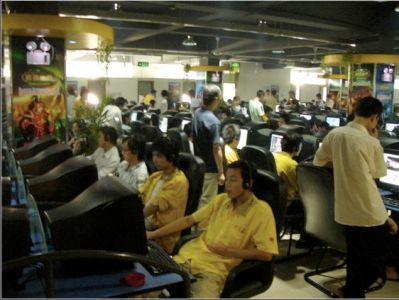
A game parlor in China
According to a World Bank report, the market of gaming-for-hire, where people get hired to play games and earn rewards or virtual money on behalf of richer players living in developed countries, was worth… 3 billion $ in 2009. In China and India alone, more than 100,000 "game laborers" would be playing day-in, day-out to be able to earn precious tokens, levels and virtual treasures to resell them to richer players that don't want or cannot put in the time!
And a definite market for "microwork" develops where people implement simple tasks like tagging pictures, removing double pages at Amazon, and get paid a few cents per task, . More on microwork in this interesting article from the Economist on "Jobs of the Future".
These are not necessarily jobs people would dream of, but they start to provide, and will provide more an more livelihood to developed countries.
Who doubted the Fourth Revolution was not happening?

February 28, 2012
Projects that are too easy, are not worthwhile
Any worthwhile project will encounter resistance. Because it tries to change the status-quo. Because if it is worthwhile, it changes its environment significantly.
Here are some contrarian thoughts about this effect:
your project does not encounter any resistance? Reevaluate if it is worthwhile!
your project does not go through hard and difficult times? Reevaluate if it is worthwhile!
Now obviously there needs to be a measure of resistance in the process. It must not be so hard as to be impossible to overcome. Still it must be hard enough so that not so many people do overcome it.
Reevaluate your current personal and professional projects. Are they difficult enough? Are they too difficult?
Most importantly, drop those that are too easy. They are probably not worthwhile.

February 25, 2012
Another institution under siege from the Fourth Revolution: Universities. Will they reinvent themselves in time?
Two Google-related university teachers have just done a mindblowing experiment that overturns conventional university education.
We know that the Fourth Revolution will overturn most institutions we've inherited from the Industrial Age. The latest to date: Universities.
It's still only a precursor, still it gives us the direction for what will happen in the next 10-20 years: the first online course from Stanford University, a course on Artificial Intelligence, has been given late 2011. The mindblowing detail of this experiment that ended up being a revolution is given in this post by Eric Salmon, "Udacity and the future of online universities". Unexpectedly, more than 160,000 students from all over the world registered and the professors had to setup a dedicated website!. Extracts from the post:
"There were more students in his course from Lithuania alone than there are students at Stanford altogether. There were students in Afghanistan, exfiltrating war zones to grab an hour of connectivity to finish the homework assignments. There were single mothers keeping the faith and staying with the course even as their families were being hit by tragedy. And when it finished, thousands of students around the world were educated and inspired. Some 248 of them, in total, got a perfect score: they never got a single question wrong, over the entire course of the class. All 248 took the course online; not one was enrolled at Stanford"
WOW. WOW! And it's not finished:
"The physical class at Stanford, which dwindled from 200 students to 30 students because the online course was more intimate and better at teaching than the real-world course on which it was based"
Read the rest of this mindblowing post! And right now, these teachers have decided to create a new online university, Udacity, which will propose soon online courses on a number of subjects, IT-related mainly.
So, what is really new? For some years already, large universities have made their courses accessible on the internet (see for example, Stanford Engineering Everywhere or MIT opencourseware); by this we mean the course material.

An institution under siege: University; here, Stanford campus
However, the lectures have never been given online, nor have students be graded or have taken exams exactly like if they were in the class. Sure it just got tried – and it works!
As many Industrial Age institutions, the classical university institution is now under siege. Sure, there will be a few more years before we'll see macroscopic effects: this experiment has been done by IT-savvy professors who also work at Google, for IT-savvy students; it will take time before this spreads to the entire faculty and all subject matters.
Still, the university institution is in question and will soon be exactly in the same conundrum like physical newspapers or the publishing industry are today. Their economic model will become unstable because it is funded by big Industrial Age corporations that seek to produce commoditized degree-holders (see the blog post on "Leave alone the academic executive programs. Go and learn real life leadership! It's cheaper and better!"). The logic of geographical concentration of university to enhance communication is obsolete as we have just seen demonstrated. So, be ready to see big changes. And Google is at the forefront of the new online university (the two teachers of that particular course are also working at Google), so that we can expect that Google will see the interest of reinventing the business model, leveraging lower fees to a much larger number of students.
Should the current universities not reinvent themselves in time (which is probable in view of the fate of most institutions when comes a fundamental revolution), other players will replace them, and they will disappear in the heap of Industrial Age institutions that did not manage to transform themselves…
If you want more in-depth analysis, more comments on this revolution in Alex Tabarrok's blog: The Coming Education Revolution (August 2011) and Udacity (January 2012).
This post has been published early February in a slightly different version on Social Media Explorer: How Google is on the Way to Take over the Higher Education Market, where it has been viewed more than 700 times.

February 23, 2012
3 useful ideas for real entrepreneurs
Once in a while I see an interesting idea for entrepreneurs and I note it down – I sometimes lose its origin though. Here are some words of wisdom for the would-be entrepreneur. Funny enough they could also apply to all of us individually.

cash issues!
"Profit in a business is like gas in a car. You don't want to run out of gas, but neither do you want to think that your road trip is a tour of gas stations" – Tim O'Reilly in a post about Steve Jobs, 'A focus on things that matter most'. In the same post there is an quote from Steve Jobs: "My passion has been to build an enduring company where people were motivated to make great products, the products, not the profits, were the motivation". The lesson is that if you want to build a great companies, focus on the clients and the products first. Profit will come, as a consequence.
A useful piece of advice about cash flow management: Cash flow is like the depth of water below the keel of your ship. You don't care if it's more than what you need to move forward. It can be 100m or 2,000m and it makes no difference. But make sure you have enough to never run aground!
A fantastic concept from the last Jim Collins's book, Great by Choice: Uncertainty, Chaos, and Luck–Why Some Thrive Despite Them All: "shoot bullets before you shoot cannonballs", or in clearer terms, don't commit large amounts of resources to a new project before you've tested it at small scale. The small scale experiments – the bullets – will give feedback and will allow to decide whether and where to shoot a cannonball that will commit lots of resources from the company. Do a lot of small scale experiments and shoot cannonballs rarely on those opportunities that are proven.
Do you have any useful piece of advice to add?

February 21, 2012
Make sure you can't U-turn for a while, but don't burn the bridge!
I have had some interesting reactions to the blog post "The art of overcoming the lizard: make U-turn impossible for some time!". Is the 'no U-turn' metaphor the right one? Actually the popular imagery for making sure you move forward and you can't move back is 'burning bridges'. I had thought using this image first, but actually that's wrong!

Burning bridges - not the right move!
Burning bridges (or boats) was a very common tactic from military generals that wanted to make sure their army would not flee – one of the most famous examples is Cortes burning the boats that had brought the conquistadores to America in 1519. Even since time immemorial that was a motivation tactics: in Sun Tzu's The Art of War, we are told: "When your army has crossed the border [into enemy territory], you should burn your boats and bridges, in order to make it clear to everybody that you have no hankering after home."
Is that really what you need to do? Right, after you burnt the bridge, the lizard brain can say what it wants, you need to move forward, or at least you can't move backwards. But you have severely reduced your options; you might also have alienated a number of people, which will have negative influences in your future activities.
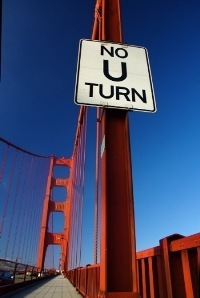 I believe it is enough to make sure you are in a "no U-turn" situation that makes sure you have to cross the bridge and taste the air on the other side. In particular when the "no U-turn" situation is linked to your ego, it is enough to calm down the lizard (I just resigned, I'm not going to come back to beg for my position, do I?).
I believe it is enough to make sure you are in a "no U-turn" situation that makes sure you have to cross the bridge and taste the air on the other side. In particular when the "no U-turn" situation is linked to your ego, it is enough to calm down the lizard (I just resigned, I'm not going to come back to beg for my position, do I?).
So, simple piece of advice: don't ever burn your bridges unless you are really compelled to to tame an insistent lizard brain. And that should never happen in normal life, only in life-and-death situation.
Take the highway and don't look back, that's enough!




